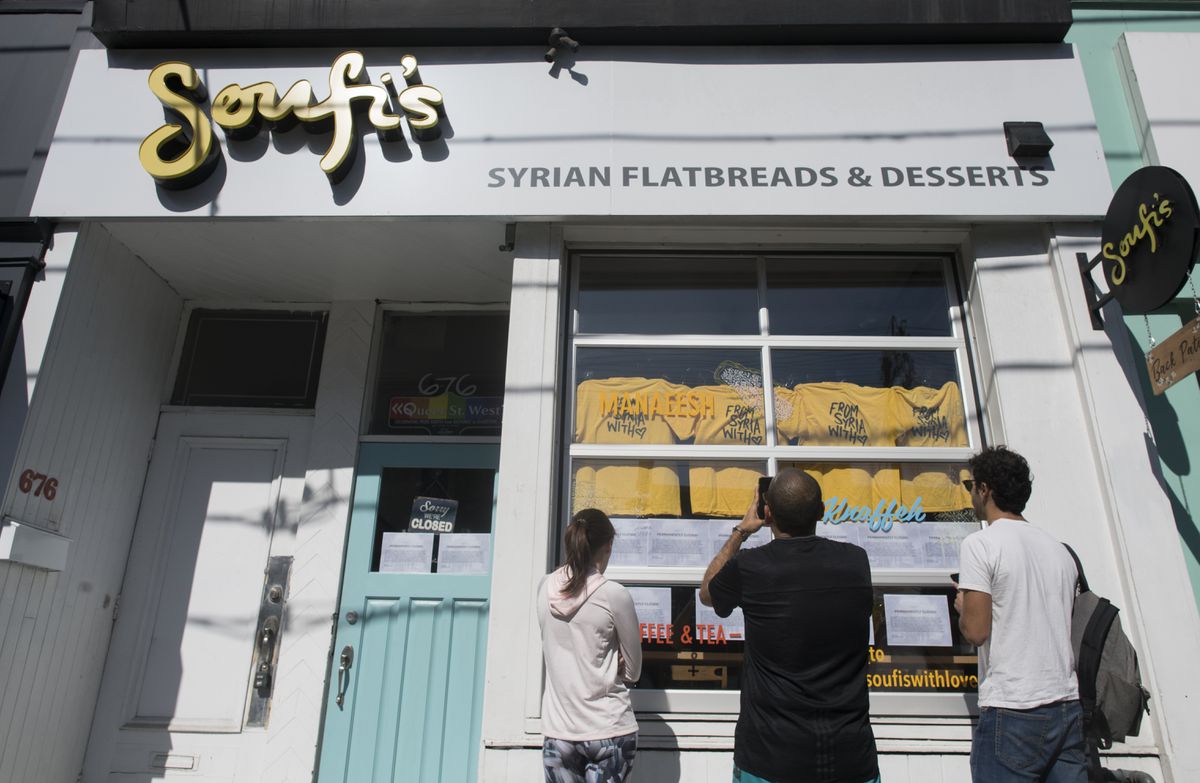
People stop to read a note taped to the front window of Syrian restaurant Soufis on Oct 8. Fred Lum/The Globe and Mail
People stop to read a note taped to the front window of Syrian restaurant Soufis on Oct 8. Fred Lum/The Globe and Mail
A Toronto restaurant run by Syrian refugees has closed after an altercation between the owner’s son and supporters of the People’s Party of Canada at a party fundraiser led to the assault of the restaurant owner’s son and death threats directed at him and his family.
Soufi’s, a Syrian restaurant opened in 2017 and lauded in media as a refugee success story, announced on Tuesday it had closed permanently because “the magnitude of hate we are facing is overwhelming.” After the owner’s son was outed as one of the protesters at the PPC event, the restaurant received harassing messages and death threats, and the family said in a statement released by its lawyer that the owner’s son was physically assaulted on Sunday. The family gave no further details of the assault.
The incident highlights the real-world consequences of the increasingly polarizing positions and hostile conversations between the right and left that have characterized the campaign for the Oct. 21 federal election.
The altercation occurred at the end of September at a People’s Party fundraiser at Mohawk College in Hamilton, at which leader Maxime Bernier and U.S. political commentator David Rubin spoke.
About 100 protesters, many wearing masks, stood outside holding signs that said things like “hate speech ≠ free speech” and shouting down those who entered. Since its formation, the People’s Party has been criticized over its platform, which would radically reduce immigration, scrap the government’s multiculturalism policy and screen potential immigrants to ensure they “align with Canadian values and societal norms.”
Dorothy Marston, an 81-year-old woman with a walker, approached the building to attend the fundraiser with her husband and was blocked by a group of masked protesters, some of whom shouted, “Nazi scum off our streets.” Police escorted Ms. Marston and her husband inside. They arrested and released four people.
A video of the confrontation has logged more than seven million views on Twitter.
Many initial reactions focused on Ms. Marston. “This makes [me] sick to my stomach! That poor lady!” one user wrote.
Mr. Bernier reteweeted a story about the incident and a video interview with Ms. Marston, calling her “brave” and the protesters “thugs.”
But later, users identified the son of Soufi’s owner as one of the protesters and doxxed him: posted his name, the restaurant’s address and phone number online, encouraging others to contact the restaurant, police and immigration officials.
The restaurant posted a message on its Facebook page (which has since been deleted), confirming that one of the individuals in the video was indeed Alaa Al Soufi, the son of Soufi’s owner Husam Al Soufi. In the video, he is silent, but stands in front of Ms. Marston’s husband, blocking his path.
“Alaa regrets that he did not step aside and/or stand up against the act of verbal abuse that occurred against [Ms. Marston], and would love the opportunity to personally extend his apologies to her. That said, we affirm that he did not in any way verbally or physically assault the elderly woman or any other person,” the statement said.
“Our family and business do not condone acts of hate, violence or harassment in any shape or form and advocate for peace, equality and free speech for all human beings.”
The statement proved ineffective.
Posts about the younger Mr. Al Soufi spread on alt-right and anti-immigrant Facebook groups such as Yellow Vests Canada and Rise Canada, where many called for violence against the Al Soufis, according to Anti-Racist Canada, a group that tracks bigotry.
On Tuesday, Soufi’s windows displayed printouts that announced the restaurant was permanently closed owing to the hateful and threatening messages received in the past week: “Our decision is made with a heavy heart in effort to maintain our family and staff’s safety.”
Two women and a man were inside putting t-shirts emblazoned with “From Syria with Love” on the windows. Attempts to reach staff were unsuccessful.
A September report about polarization in the Canadian federal election campaign, for which researchers at the Digital Democracy Project (run by the Public Policy Forum and Max Bell School of Public Policy at McGill University) surveyed 1,271 Canadians, found little evidence to suggest social-media polarization translates to offline impact. But they said individuals tended to dislike ”parties or their supporters on the other end of the political spectrum simply because they belong to an opposing group.”
Ms. Marston’s son, David Turkoski, said he respects anyone’s right to protest, but was angry about what happened to his mother because of the aggressive nature of the protesters. Still, he described the blow-back the Al Soufis have faced as “a disgrace to Canada.”
“We live in a just society. We don’t need vigilantes,” he said. “As I told my mother, ‘We don’t know who they are and that’s something that police look after.’ ”
Mr. Turkoski reposted one of Mr. Bernier’s tweets praising his mother for her bravery and said protesters’ characterization of Mr. Bernier’s platform as xenophobic and racist is “unfair.” But he said he does not plan to vote for the People’s Party. His lasting concern is for “the name-calling and mud-slinging” that has marked the campaign.
“I’m really worried for Canada and this polarization effect on both sides,” he said.
Dakshana Bascaramurty
The Globe and Mail, October 8, 2019
Note: On October 11 it was announced that the restaurant would reopen.

